what institution proved itself to be the strongest thing in europe
The Iron Curtain that once divided Europe may exist long gone, but the continent today is split by stark differences in public attitudes toward faith, minorities and social issues such as gay marriage and legal ballgame. Compared with Western Europeans, fewer Key and Eastern Europeans would welcome Muslims or Jews into their families or neighborhoods, extend the right of marriage to gay or lesbian couples or augment the definition of national identity to include people born outside their state.
These differences sally from a series of surveys conducted by Pew Research Centre betwixt 2015 and 2017 amongst virtually 56,000 adults (ages 18 and older) in 34 Western, Primal and Eastern European countries, and they continue to carve up the continent more than a decade after the European Union began to expand well beyond its Western European roots to include, among others, the Central European countries of Poland and Hungary, and the Baltic states of Republic of estonia, Latvia and Lithuania.
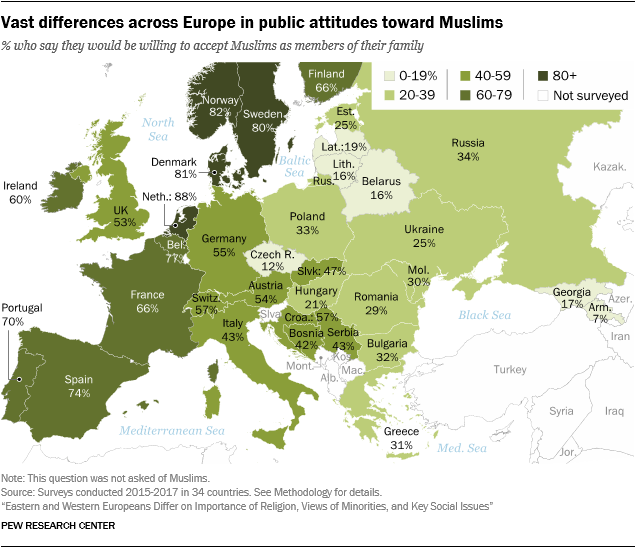
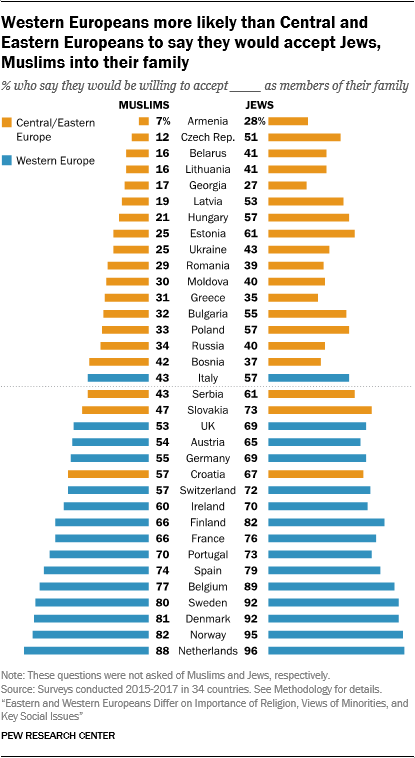 The continental divide in attitudes and values tin be extreme in some cases. For example, in nearly every Cardinal and Eastern European state polled, fewer than one-half of adults say they would exist willing to accept Muslims into their family; in almost every Western European state surveyed, more than one-half say they would accept a Muslim into their family. A similar divide emerges between Cardinal/Eastern Europe and Western Europe with regard to accepting Jews into one'due south family.
The continental divide in attitudes and values tin be extreme in some cases. For example, in nearly every Cardinal and Eastern European state polled, fewer than one-half of adults say they would exist willing to accept Muslims into their family; in almost every Western European state surveyed, more than one-half say they would accept a Muslim into their family. A similar divide emerges between Cardinal/Eastern Europe and Western Europe with regard to accepting Jews into one'due south family.
In a separate question, Western Europeans also are much more probable than their Central and Eastern European counterparts to say they would accept Muslims in their neighborhoods.1 For instance, 83% of Finns say they would be willing to take Muslims every bit neighbors, compared with 55% of Ukrainians. And although the divide is less stark, Western Europeans are more probable to limited acceptance toward Jews in their neighborhoods likewise.
Defining the boundaries of Eastern and Western Europe
The definition and boundaries of Central, Eastern and Western Europe tin can be debated. No matter where the lines are fatigued, yet, there are stiff geographic patterns in how people view religion, national identity, minorities and fundamental social issues. Particularly sharp differences emerge when comparing attitudes in countries historically associated with Eastern vs. Western Europe.
In countries that are centrally located on the continent, prevailing attitudes may marshal with popular opinions in the East on some problems, while more than closely reflecting Western public sentiment on other matters. For instance, Czechs are highly secular, generally favor same-sex union and do non acquaintance Christianity with their national identity, like to most Western Europeans. Merely Czechs also limited low levels of credence toward Muslims, more than closely resembling their neighbors in the E. And most Hungarians say that being built-in in their country and having Hungarian beginnings are important to being truly Hungarian – a typically Eastern European view of national identity. Yet, at the same time, only about vi-in-ten Hungarians believe in God, reflecting Western European levels of belief.
In some other cases, Central European countries autumn between the E and the Due west. Roughly half of Slovaks, for example, say they favor same-sex marriage, and a like share say they would accept Muslims in their family – lower shares than in well-nigh Western European countries, just well above their neighbors in the East. And still others simply lean toward the East on most problems, as Poland does on views of national identity and Muslims, also as same-sexual activity marriage and abortion.
Researchers included Poland, the Czechia, Slovakia, Hungary, the Baltics and the Balkans as part of "Central and Eastern Europe" considering all these countries were part of the Soviet sphere of influence in the 20th century. Although Greece was not office of the Eastern bloc, it is categorized in Central and Eastern Europe because of both its geographical location and its public attitudes, which are more in line with Eastern than Western Europe on the issues covered in this written report. For example, most Greeks say they are not willing to accept Muslims in their families; three-quarters consider existence Orthodox Christian important to being truly Greek; and near nine-in-ten say Greek civilisation is superior to others. East Germany is another unusual case; it was office of the Eastern bloc, just is now included in Western Europe as part of a reunified Deutschland.
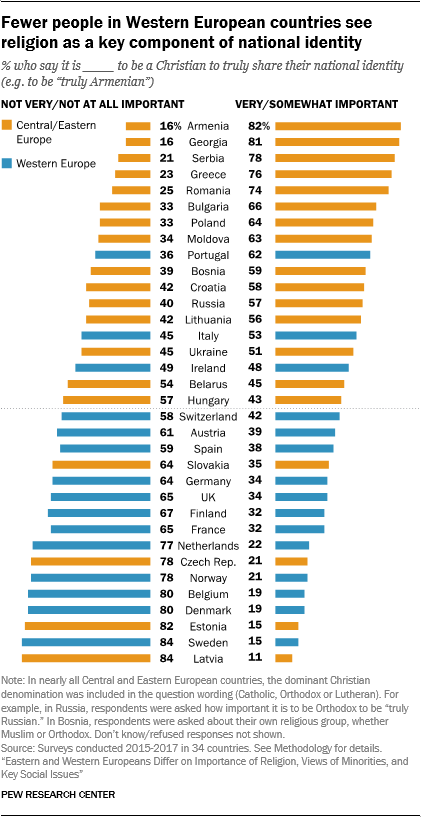
Attitudes toward religious minorities in the region go hand in paw with differing conceptions of national identity. When they were in the Soviet Union'due south sphere of influence, many Central and Eastern European countries officially kept organized religion out of public life. But today, for most people living in the former Eastern bloc, being Christian (whether Catholic or Orthodox) is an of import component of their national identity.
In Western Europe, by contrast, nearly people don't feel that religion is a major part of their national identity. In France and the Uk, for instance, nearly say it is not important to be Christian to be truly French or truly British.
To be sure, not every state in Europe neatly falls into this pattern. For example, in the Baltic states of Latvia and Estonia, the vast majority of people say beingness Christian (specifically Lutheran) is not important to their national identity. Still, relatively few express willingness to accept Muslims as family members or neighbors.
Simply a general East-Due west pattern is also apparent on at least one other measure of nationalism: cultural chauvinism. The surveys asked respondents across the continent whether they concord with the argument, "Our people are not perfect, but our culture is superior to others." While there are exceptions, Central and Eastern Europeans overall are more inclined to say their culture is superior. The 8 countries where this mental attitude is well-nigh prevalent are all geographically in the East: Hellenic republic, Georgia, Armenia, Bulgaria, Russian federation, Bosnia, Romania and Serbia.
People in Key and Eastern Europe as well are more than likely than Western Europeans to say existence born in their country and having family background at that place are important to truly share the national identity (e.chiliad., to exist truly Romanian; see here.).
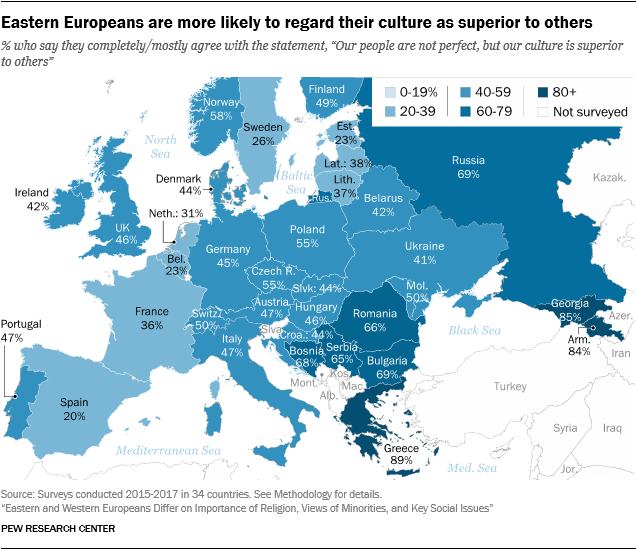
Taken together, these and other questions about national identity, religious minorities and cultural superiority would seem to betoken a European separate, with high levels of religious nationalism in the E and more than openness toward multiculturalism in the West. Other questions asked on the survey point to a further Eastward-West "values gap" with respect to key social problems, such as same-sex activity spousal relationship and legal abortion.
Differences over the meaning of 'European values'
Is Christianity a "European value?" What almost secularism? And how about multiculturalism and open borders?
Leaders ofttimes cite European values when defending their stances on highly charged political topics. Simply the term "European values" can mean different things to different people. For some, it conjures up the continent's Christian heritage; for others, it connotes a broader political liberalism that encompasses a separation betwixt church and land, aviary for refugees, and autonomous authorities.
For the European Wedlock, whose members include 24 of the 34 countries surveyed in this report, the term "European values" tends to signify what Americans might consider liberal ideals.two The "Charter of Fundamental Rights of the European Wedlock" includes respect for cultural and religious multifariousness; prohibitions against bigotry based on religion and sexual orientation; the right to asylum for refugees; and guarantees of freedom of movement within the European union.3
These rights and principles are part of the EU's legal organization and accept been affirmed in decisions of the European Court of Justice going back decades.4 But the membership of the Eu has changed in recent years, beginning in 2004 to spread significantly from its celebrated western base into Central and Eastern Europe. Since that yr, Bulgaria, Croatia, Cyprus, the Czech Republic, Estonia, Hungary, Republic of latvia, Lithuania, Malta, Poland, Romania, Slovakia and Slovenia take joined the EU. In many of these countries, the surveys prove that people are less receptive to religious and cultural pluralism than they are in Western Europe – challenging the notion of universal assent to a set up of European values.
These are not the merely issues dividing Eastern and Western Europe.five But they have been in the news since a surge in clearing to Europe brought record levels of refugees from predominantly Muslim countries and sparked vehement debates amongst European leaders and policymakers about border policies and national values.
Hungarian Prime Minister Viktor Orbán has articulated one strain of opposition to the EU's formulation of European values, declaring in July 2018 that "Cardinal Europe … has a special civilization. It is different from Western Europe." Every European land, he said, "has the right to defend its Christian culture, and the correct to reject the ideology of multiculturalism," also as the right to "reject immigration" and to "defend the traditional family model." Earlier in the twelvemonth, in an address to the Hungarian parliament, he criticized the Eu stance on migration: "In Brussels at present, thousands of paid activists, bureaucrats and politicians work in the direction that migration should be considered a human being right. … That'south why they want to take abroad from us the right to decide with whom nosotros want to live."
This is not to advise that support for multiculturalism is universal even in Western Europe. Substantial shares of the public in many Western European countries view existence Christian as a key component of their national identity and say they would not accept Muslims or Jews every bit relatives. And of class, the United Kingdom voted in 2016 to leave the European Union, which many accept suggested came in office due to concerns about immigration and open borders. Only on the whole, people in Western European countries are much more probable than their neighbors in the East to embrace multiculturalism.
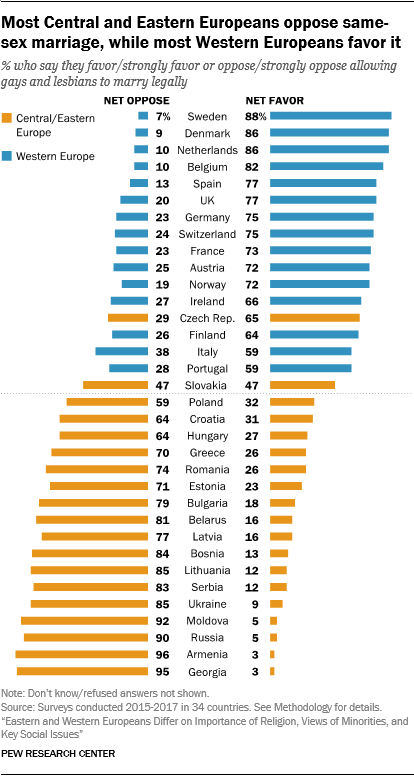 Majorities favor same-sex marriage in every Western European country surveyed, and nearly all of these countries have legalized the practice. Public sentiment is very different in Central and Eastern Europe, where majorities in nearly all countries surveyed oppose assuasive gays and lesbians to ally legally. None of the Central and Eastern European countries surveyed allow same-sex marriages.
Majorities favor same-sex marriage in every Western European country surveyed, and nearly all of these countries have legalized the practice. Public sentiment is very different in Central and Eastern Europe, where majorities in nearly all countries surveyed oppose assuasive gays and lesbians to ally legally. None of the Central and Eastern European countries surveyed allow same-sex marriages.
In some cases, these views are almost universally held. Fully nine-in-ten Russians, for instance, oppose legal aforementioned-sex marriage, while similarly lopsided majorities in the Netherlands, Denmark and Sweden favor assuasive gay and lesbian couples to ally legally.
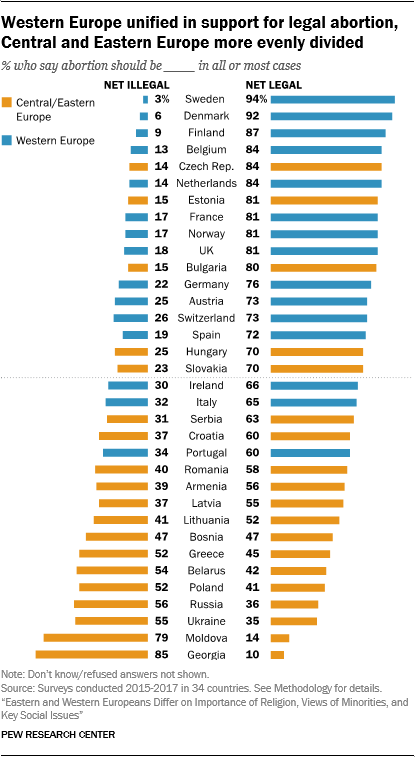 Even though abortion generally is legal in both Central/Eastern and Western Europe, there are regional differences in views on this topic, too.6 In every Western European nation surveyed – including the heavily Cosmic countries of Republic of ireland, Italy and Portugal – six-in-ten or more than adults say abortion should be legal in all or most cases.
Even though abortion generally is legal in both Central/Eastern and Western Europe, there are regional differences in views on this topic, too.6 In every Western European nation surveyed – including the heavily Cosmic countries of Republic of ireland, Italy and Portugal – six-in-ten or more than adults say abortion should be legal in all or most cases.
Merely in the East, views are more varied. To be sure, some Central and Eastern European countries, such equally the Czechia, Republic of estonia and Bulgaria, overwhelmingly favor legal abortion. But in several others, including Poland, Russian federation and Ukraine, the residue of opinion tilts in the other direction, with respondents more likely to say that ballgame should be by and large or entirely illegal.
Survey results suggest that Europe's regional divide over same-sex activity marriage could persist into the hereafter: Across nigh of Key and Eastern Europe, young adults oppose legalizing gay marriage by only somewhat narrower margins than practice their elders.
For example, 61% of younger Estonians (ages xviii to 34) oppose legal gay marriage in their country, compared with 75% of those 35 and older. Past this mensurate, young Estonian adults are still six times every bit likely as older adults in Kingdom of denmark (10%) to oppose aforementioned-sex spousal relationship. This blueprint holds across the region; young adults in almost every Central and Eastern European country are much more than conservative on this upshot compared with both younger and older Western Europeans.
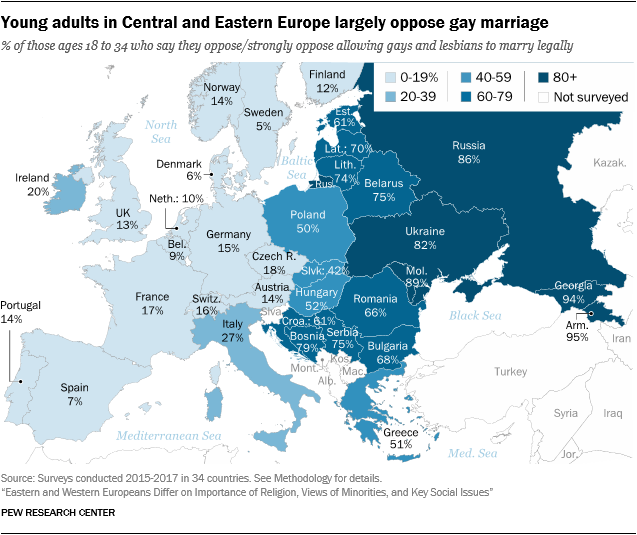
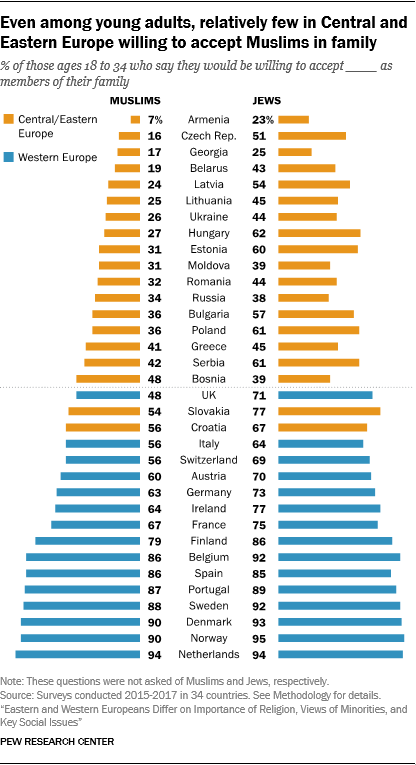 In addition, when it comes to views about Muslims and Jews, young adults in about countries in Primal and Eastern Europe are no more than accepting than their elders.
In addition, when it comes to views about Muslims and Jews, young adults in about countries in Primal and Eastern Europe are no more than accepting than their elders.
Consequently, those in this younger generation in Central and Eastern Europe are much less probable than their peers in Western Europe to express openness to having Muslims or Jews in their families. For example, 36% of Polish adults under 35 say they would be willing to have Muslims in their family, far below the ii-thirds of young French adults who say they would be willing to accept Muslims in their family unit – mirroring the overall publics in those countries.
These are amidst the findings of Pew Research Middle surveys conducted beyond Primal and Eastern Europe in 2015 and 2016 and Western Europe in 2017.7
The Center previously has published major reports on both surveys: "Religious Belief and National Belonging in Key and Eastern Europe" and "Being Christian in Western Europe." Many of the aforementioned questions were asked in both regions, allowing for the comparisons in this report. The Central and Eastern Europe surveys were conducted via face-to-face-interviews, while Western Europeans were surveyed by telephone. See Methodology for details.
The remainder of this report volition look at more cross-regional comparisons, including:
- Identification with Christianity has declined over time across Western Europe, but this is not the case in much of Central and Eastern Europe. In virtually countries in the East, the share of Christians has remained fairly stable in contempo generations. And in a few countries, including Russia, Christians have increased as a percentage of the population.
- Compared with the rest of the world, the entire European continent has relatively low levels of traditional religious practice (eastward.1000., church omnipresence, prayer), but they are slightly higher in Central and Eastern Europe than in the Westward. On balance, Central and Eastern Europeans as well are more likely to say they believe in God, and to limited some New Age or folk religious behavior – such equally that certain people tin can cast curses or spells that cause bad things to happen to someone (the "evil eye").
- Across the continent, Europeans mostly say religion and government should exist kept divide. But this view is more widespread in Western Europe, while several Primal and Eastern European countries are more than divided. For instance, 46% of Romanians say their government should promote religious values and beliefs.
- In addition to the importance of organized religion to national identity, the surveys also asked nearly several other possible elements of national identity. People throughout the continent say it is of import to respect national institutions and laws and speak the dominant national language to be a true member of their state, simply Central and Eastern Europeans are peculiarly probable to say that nativist elements of national identity – being born in a land and having family beginnings there – are very important.
Orthodoxy, Catholicism and Protestantism are each prominent in different parts of Europe
Christianity has long been the prevailing religion in Europe, and it remains the majority religious amalgamation in 27 of the 34 countries surveyed. But historical schisms underlie this common religious identity: Each of the 3 major Christian traditions – Catholicism, Protestantism and Orthodoxy – predominates in a certain part of the continent.
Orthodoxy is the dominant religion in the Eastward, including in Hellenic republic, Russian federation, the former Soviet republics of Moldova, Armenia, Georgia, Ukraine and Republic of belarus, and other former Eastern bloc countries such equally Serbia, Romania and Republic of bulgaria. Catholic-majority countries are prevalent in the central and southwestern parts of Europe, cutting a swath from Lithuania through Poland, Slovakia and Republic of hungary, so extending westward across Croatia, Austria, Italy and France to the Iberian Peninsula. And Protestantism is the dominant Christian tradition in much of Northern Europe, specially Scandinavia.
There are substantial populations belonging to non-Christian religions – specially Islam – in many European countries. In Bosnia, roughly half of the population is Muslim, while Russian federation and Bulgaria have sizable Muslim minority populations. Simply in most other countries surveyed, Muslims and Jews brand up relatively minor shares of the population, and surveys frequently are not able to reliably measure out their precise size.
In addition, all the Western European countries surveyed take sizable populations of religiously unaffiliated people – those who place as atheist, agnostic or "nothing in particular," collectively sometimes called "nones." "Nones" make up at to the lowest degree 15% of the population in every Western European state surveyed, and they are specially numerous in the Netherlands (48%), Norway (43%) and Sweden (42%). On residuum, there are smaller shares of "nones" – and larger shares of Christians – in Central and Eastern Europe, though a plurality of Estonians (45%) are unaffiliated, and the Czech Republic is the only country surveyed on the unabridged continent where "nones" form a majority (72%).
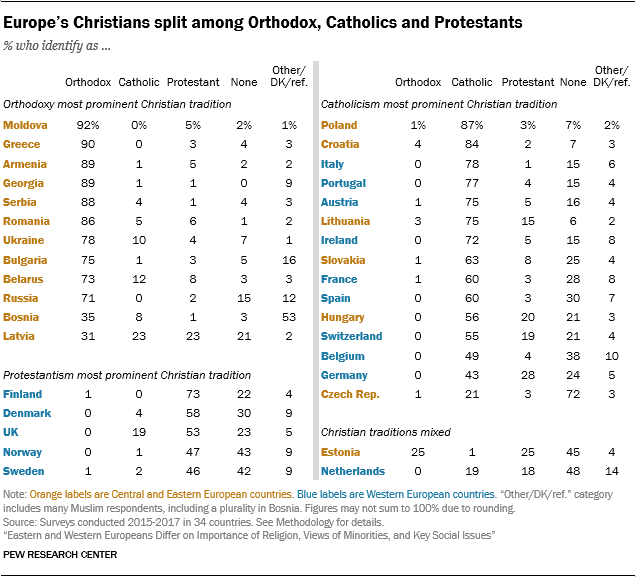
Christian affiliation has declined in Western Europe
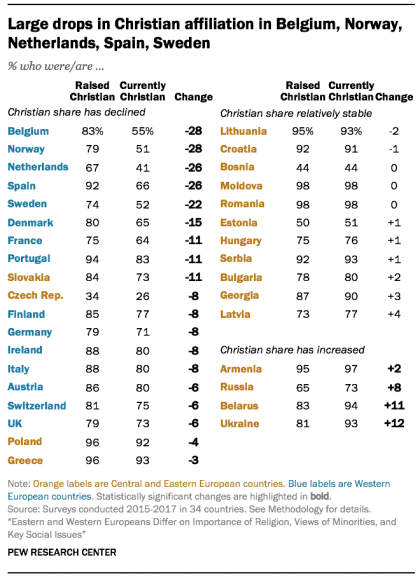 The lower Christian shares in Western Europe reflect how the region'due south religious mural has been changing within the lifetimes of survey respondents.
The lower Christian shares in Western Europe reflect how the region'due south religious mural has been changing within the lifetimes of survey respondents.
While large majorities beyond the continent say they were baptized Christian, and almost European countries still take solid Christian majorities, the survey responses point a pregnant pass up in Christian amalgamation throughout Western Europe. By contrast, this trend has not been seen in Central and Eastern Europe, where Christian shares of the population accept generally been stable or even increasing.
Indeed, in a part of the region where communist regimes once repressed religious worship, Christian amalgamation has shown a resurgence in some countries since the fall of the USSR in 1991. In Ukraine, for example, more than people say they are Christian now (93%) than say they were raised Christian (81%); the aforementioned is true in Russia, Belarus and Armenia. In about other parts of Key and Eastern Europe, Christian shares of the population have been relatively stable by this measure out.
Meanwhile, far fewer Western Europeans say they are currently Christian than say they were raised Christian. In Belgium, for instance, 55% of respondents currently identify as Christian, compared with 83% proverb they were raised Christian.
What are the reasons for these opposing patterns on unlike sides of the continent? Some appear to be political: In Russian federation and Ukraine, the most mutual caption given by those who were raised without a faith only are now Orthodox is that organized religion has become more acceptable in social club. Another important reason is a connectedness with their national heritage.
In Western Europe, there are a variety of reasons why many adults who were raised Christian have go unaffiliated. Most of these adults say they "gradually drifted abroad from faith," though many as well say they disagreed with church positions on social problems like homosexuality and abortion, and/or that they stopped believing in religious teachings.
Religious commitment particularly low in Western Europe
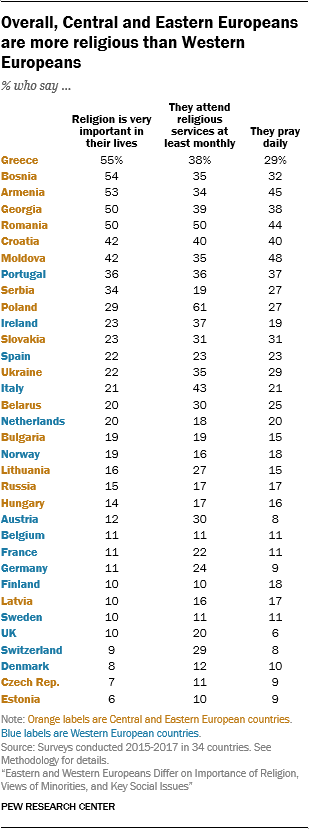 Not only is religious affiliation on the decline in Western Europe, religious commitment also is generally lower there than in Key and Eastern Europe.
Not only is religious affiliation on the decline in Western Europe, religious commitment also is generally lower there than in Key and Eastern Europe.
This is not to say that Cardinal and Eastern Europeans are very religious past conventional measures of religious behavior. Europeans throughout the continent generally prove far less religious delivery than adults previously surveyed in other regions.8
That said, on balance, Key and Eastern Europeans are more likely than Western Europeans to say that religion is very important in their lives, that they attend religious services at least monthly, and that they pray every twenty-four hour period.
For instance, fully one-half or more than of adults in Greece, Bosnia, Armenia, Georgia and Romania say faith is very important in their lives, compared with well-nigh 1-in-ten in French republic, Deutschland, the United Kingdom and several other Western European countries. Similarly, roughly 3-in-ten Slovaks, Greeks and Ukrainians say they pray daily, compared with eight% in Austria and Switzerland. Western Europeans also are more likely than their neighbors in the E to say they never pray (due east.g., 62% in Denmark vs. 28% in Russia).
Substantial shares in Western Europe don't believe in God
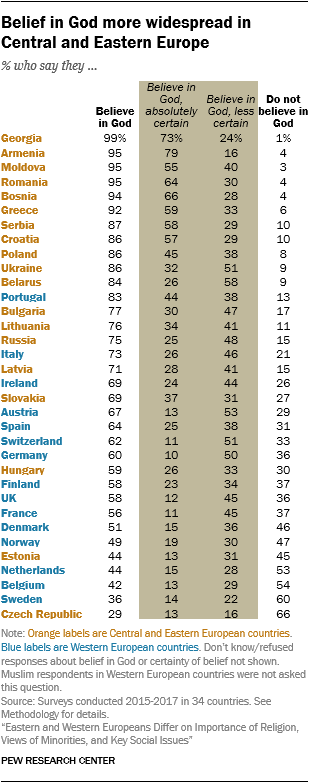 Western Europeans likewise express belief in God at lower levels than people in Central and Eastern Europe, where large majorities say they believe in God – including overwhelming shares in several countries, such as Georgia, Armenia, Moldova and Romania. Among the Central and Eastern European countries surveyed, there are only 3 exceptions where fewer than two-thirds of adults say they believe in God: Hungary (59%), Estonia (44%) and the Czech Democracy (29%).
Western Europeans likewise express belief in God at lower levels than people in Central and Eastern Europe, where large majorities say they believe in God – including overwhelming shares in several countries, such as Georgia, Armenia, Moldova and Romania. Among the Central and Eastern European countries surveyed, there are only 3 exceptions where fewer than two-thirds of adults say they believe in God: Hungary (59%), Estonia (44%) and the Czech Democracy (29%).
Past contrast, fewer than ii-thirds of adults in virtually Western European countries surveyed say they believe in God, and in some countries with big populations of "nones," such as the Netherlands, Belgium and Sweden, fewer than one-half of adults believe in God.
Western Europeans also are less likely to say they are certain of their belief in God. Among the Western European countries surveyed, but in Portugal (44%) do more than than three-in-x say they are admittedly certain that God exists. But majorities in several of the Central and Eastern European countries surveyed express such certainty almost God's existence, including in Romania (64%), Greece (59%) and Republic of croatia (57%).
Majorities in about Central and Eastern European countries believe in fate
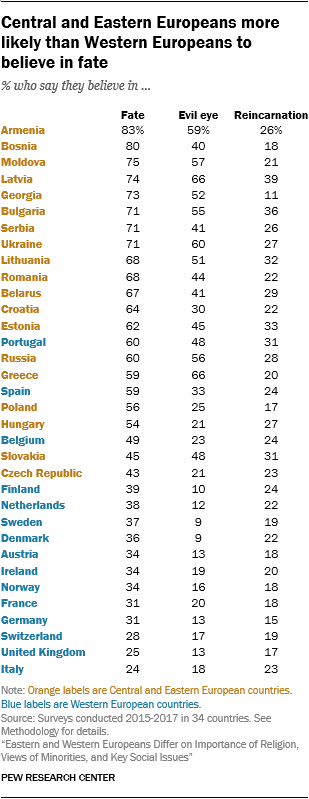 In add-on to conventionalities in God, Central and Eastern Europeans are more likely than Western Europeans to limited conventionalities in fate (that the class of life is largely or wholly preordained), likewise as in some phenomena not typically linked with Christianity, including the "evil eye" (that certain people can cast curses or spells that cause bad things to happen to someone).
In add-on to conventionalities in God, Central and Eastern Europeans are more likely than Western Europeans to limited conventionalities in fate (that the class of life is largely or wholly preordained), likewise as in some phenomena not typically linked with Christianity, including the "evil eye" (that certain people can cast curses or spells that cause bad things to happen to someone).
Majorities in most Primal and Eastern European countries surveyed say they believe in fate, including well-nigh eight-in-ten in Armenia (83%) and Bosnia (lxxx%). In Western Europe, far fewer people believe their lives are preordained – roughly four-in-ten or fewer in virtually of the countries surveyed.
Conventionalities in the evil center is as well common in Central and Eastern Europe. This conventionalities is well-nigh widespread in Greece (66%), Latvia (66%), Ukraine (lx%), Armenia (59%), Moldova (57%), Russia (56%) and Republic of bulgaria (55%).
In fact, the levels of belief in the evil center across Cardinal and Eastern Europe are comparable to those found in Latin America and sub-Saharan Africa, where indigenous religions have had a broad impact on the corresponding cultures. (See "Religion in Latin America: Widespread Change in a Historically Catholic Region" and "Tolerance and Tension: Islam and Christianity in Sub-Saharan Africa.") In Western Europe, on the other manus, in no country does a majority express belief in the evil eye.
Levels of conventionalities in reincarnation are more comparable across the region. In nearly Cardinal and Eastern European countries surveyed, a quarter or more say they believe in reincarnation – that is, that people will be reborn in this world over again and over again. In many Western European countries surveyed, roughly one-fifth of the population expresses belief in reincarnation, a concept more than closely associated with Eastern religions such as Hinduism and Buddhism than with Christianity.
Prevailing view across Europe is that religion and regime should be carve up
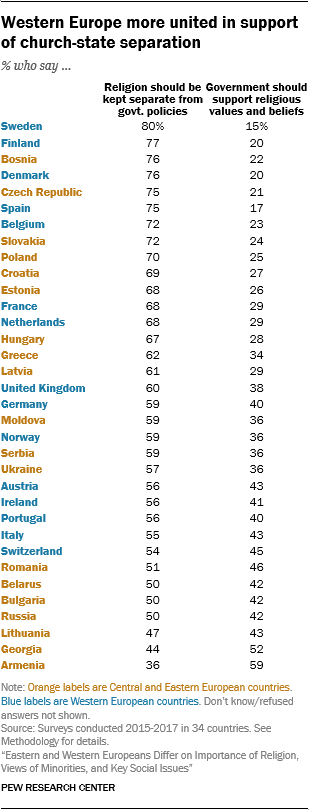 Europeans across the continent are largely united in support of a separation between religion and government. More than than one-half of adults in most countries say religion should be kept carve up from government policies, rather than the opposing view that government policies should support religious values and beliefs.
Europeans across the continent are largely united in support of a separation between religion and government. More than than one-half of adults in most countries say religion should be kept carve up from government policies, rather than the opposing view that government policies should support religious values and beliefs.
In seven Central and Eastern European countries, however, the view that church and country should be separate falls short of a majority position. This includes Armenia and Georgia – where the residual of opinion favors authorities support for religious values and behavior – likewise every bit Russia, where 42% of adults say the government should promote religion.
In Western Europe, meanwhile, majorities in nearly every country surveyed say religion should be kept separate from regime policies.
Age differences are stronger in Western Europe than in Eastern Europe on this upshot: Younger adults across nearly of Western Europe are more likely than those ages 35 and older to prefer separation of church and state. In Cardinal and Eastern Europe, meanwhile, younger and older adults limited roughly like views on this question.
Europe split up on importance of ancestry to national identity, united on importance of speaking national language
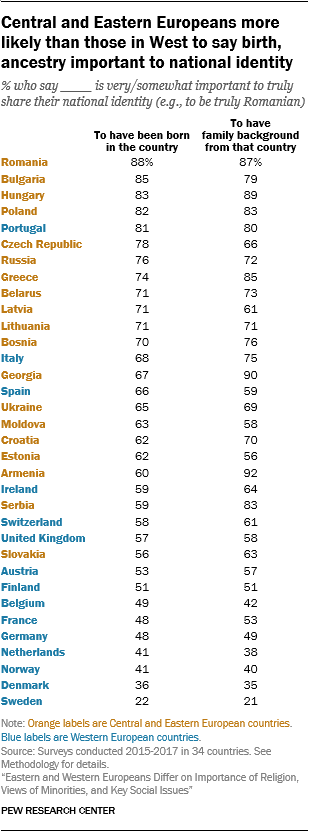 While majorities in nigh Central and Eastern European countries tie being Christian to being truly Serbian, Smoothen, etc. (see here), majorities in all of these countries view beingness born in their country and having ancestry at that place as of import components of national identity.
While majorities in nigh Central and Eastern European countries tie being Christian to being truly Serbian, Smoothen, etc. (see here), majorities in all of these countries view beingness born in their country and having ancestry at that place as of import components of national identity.
For instance, 83% of adults in Hungary and 82% of adults in Poland say it is "very" or "somewhat" important to have been built-in in their country to exist "truly Hungarian" or "truly Smoothen." And 72% of Russians say information technology is important to have Russian family background to be "truly Russian."
On remainder, adults in Western European countries are less likely to view these nativist elements every bit important to national identity. For example, majorities in Sweden, Denmark, the Netherlands and Kingdom of norway say it is "not very" or "not at all" important to exist born in their country or have family background there to be "truly Swedish," etc.
Only non anybody across Western Europe feels this way. In Portugal, for example, the vast majority of adults say that beingness born in Portugal (81%) and having a Portuguese family background (fourscore%) are very or somewhat important to being "truly Portuguese." These sentiments too are widespread amidst adults in Italy and Kingdom of spain.
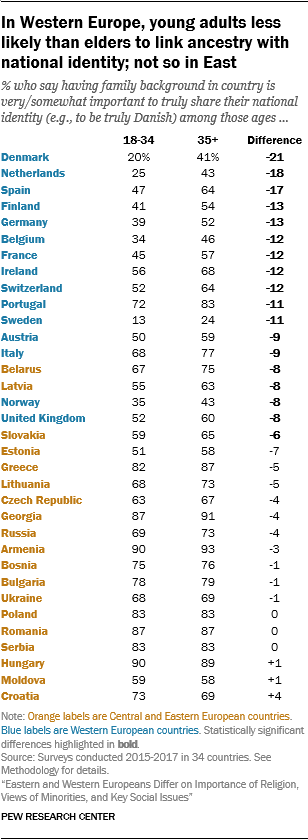 The two sides of Europe do not appear to be moving closer on these questions with younger generations. In fact, the opposite is true: In Western Europe, young adults (ages 18 to 34) are less probable than their elders to regard birthplace and beginnings as crucial to national identity, while in Central and Eastern Europe, young adults and older people are about equally likely to experience this way. In Kingdom of spain, for example, only about half of adults nether 35 (47%) say having Castilian ancestry is important to being Castilian, compared with 64% of older Spaniards. In Ukraine, meanwhile, young adults and older adults look very similar on this question (68% vs. 69%).
The two sides of Europe do not appear to be moving closer on these questions with younger generations. In fact, the opposite is true: In Western Europe, young adults (ages 18 to 34) are less probable than their elders to regard birthplace and beginnings as crucial to national identity, while in Central and Eastern Europe, young adults and older people are about equally likely to experience this way. In Kingdom of spain, for example, only about half of adults nether 35 (47%) say having Castilian ancestry is important to being Castilian, compared with 64% of older Spaniards. In Ukraine, meanwhile, young adults and older adults look very similar on this question (68% vs. 69%).
Apropos the importance of family background to national identity, there is a bigger gap between young adults in Western Europe and immature adults in Central and Eastern Europe than between the adult populations as a whole.
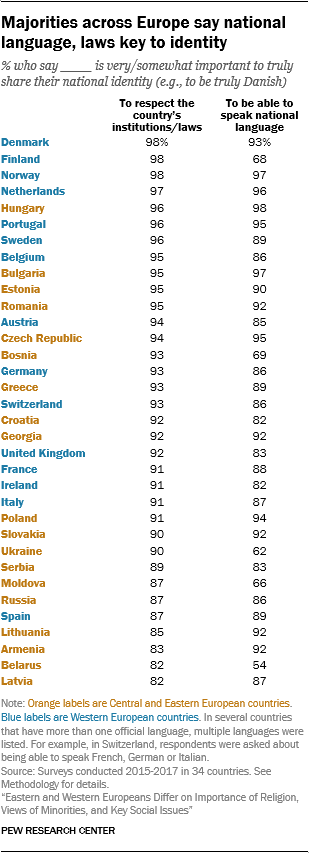 While public stance on the importance of religion, birthplace and ancestry to national identity is different in Fundamental and Eastern Europe than it is in the West, people throughout the continent largely concur on another elements of national belonging. Adults in both regions say information technology is important to respect their country's institutions and laws and to be able to speak the national linguistic communication to truly share their national identity.
While public stance on the importance of religion, birthplace and ancestry to national identity is different in Fundamental and Eastern Europe than it is in the West, people throughout the continent largely concur on another elements of national belonging. Adults in both regions say information technology is important to respect their country's institutions and laws and to be able to speak the national linguistic communication to truly share their national identity.
In fact, overwhelming majorities of adults in every European land surveyed – East and West akin – say it is important to respect the laws of their country in order to truly vest. For instance, 98% of Danes, 96% of Hungarians and 87% of Russians say it is of import to respect their institutions and laws to truly exist Danish, Hungarian or Russian.
And large shares in both Eastern and Western European countries say speaking the national linguistic communication is important to sharing their national identity. For example, in the Netherlands, 96% of adults say speaking Dutch is important for being truly Dutch. And in Georgia, 92% of adults say it is important to speak Georgian to truly share their national identity. There are a few countries, even so, where this sentiment is somewhat less common: Only about 2-thirds of adults in Moldova, Finland and Bosnia say speaking the national linguistic communication is important to truly belonging to their country, equally do but 62% of Ukrainians and 54% of Belarusians. This may reflect the fact that multiple languages are spoken in these countries, including large numbers of Russian speakers in Moldova, Ukraine and Belarus.
Source: https://www.pewresearch.org/religion/2018/10/29/eastern-and-western-europeans-differ-on-importance-of-religion-views-of-minorities-and-key-social-issues/
0 Response to "what institution proved itself to be the strongest thing in europe"
Enregistrer un commentaire